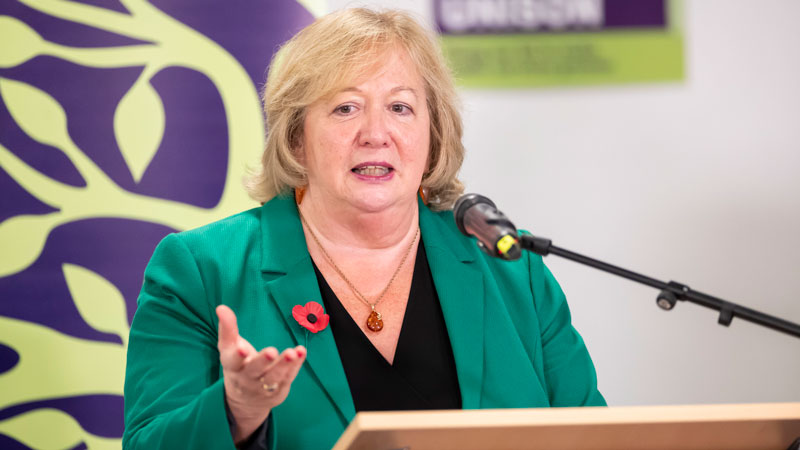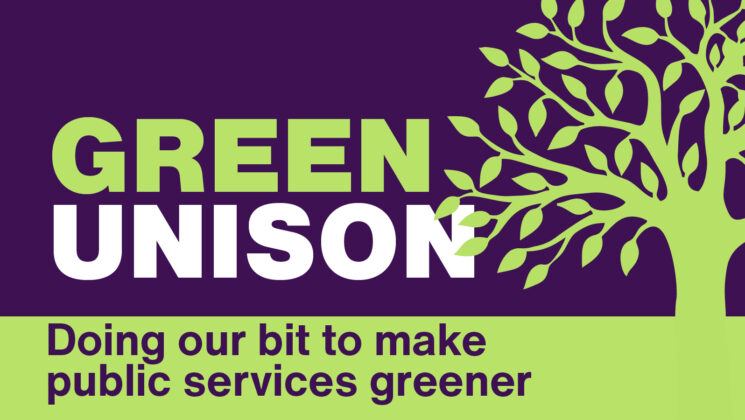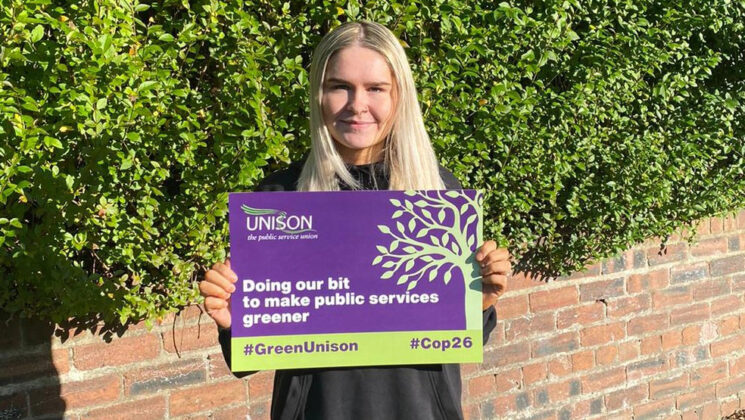UNISON launched a groundbreaking environmental report today, providing evidence that the government must act urgently on its green promises to decarbonise UK public services if the country is to have any hope of reaching net zero carbon emissions by 2050.
General secretary Christina McAnea introduced Getting to net zero in UK public services: The road to decarbonisation at the union’s Glasgow offices, at the mid-point of the COP26 climate conference in the city.
“We cannot allow the government’s existing lack of climate ambition or commitment to provide decarbonisation funds to continue, or it will be too little and too late,” she said.
“Only by acting now do we put UK public services on the right path to a safe climate future.”
The task at hand
Public services as a whole (excluding transport) represents about 8% of the UK’s direct greenhouse gas emissions – the NHS alone represents about 4% of those emissions. When procurement, construction and social housing are taken into account, the impacts are much greater.
Different sectors within the overall framework of public services have declared their decarbonisation plans, with some ahead of the national targets. The NHS has declared that it will reach net zero by 2040, with an ambition to reach an 80% reduction by 2028 to 2032.
More than one-third of local authorities (single and upper tier) have committed themselves to decarbonise their local areas by or before 2030.
However, in UNISON’s analysis, central government needs to commit to providing transparent public funding of over £140 billion up to 2035, to fund the urgent actions needed to meet those ambitions and decarbonise public services.
At present, it has committed just £8.2 billion towards such measures, a meagre 7% of what is needed.
And without adequate national funding, the report argues, public services can only achieve green outcomes in an ad hoc and piecemeal way, increasing the risk of not meeting their statutory targets for decarbonisation – unless they divert funds from already underfunded public service budgets.
Ms McAnea warned: “Without an additional decarbonisation funding stream, our hospitals and care services and local governments will be forced to use money from their own existing budgets, which will harm our already underfunded and overstretched public services.”

© Roddy Scott
The pivotal role of public services
The report states that building a resilient green economy, as part of the UK recovery from the pandemic, represents a “once in a generation challenge” that the government must now rise to.
“Public services play a vital role in helping to implement and coordinate paths for decarbonisation. They should be at the centre of efforts to secure greener outcomes nationally and locally, in our workplaces and communities,” it states.
“In terms of public service delivery, hospitals, schools and colleges, care homes and services, local government buildings, leisure centres, police and courts, social and community housing, water, transport and environment services will all need to decarbonise.
“Key to this success is a social partnership approach, engaging with public service workers and their unions to ensure the transition to net zero is just and fair – protecting and creating jobs, improving our health and the planet.”
The report has three key findings:
- The government needs to start funding public service decarbonisation now. This requires an estimated capital investment of £140 billion up to 2035, where at least £122 billion should be provided by central government;
- The government must set up a separate and significant additional climate and decarbonisation budget, funded by Whitehall, otherwise public services will find it difficult to meet their statutory climate duties and net zero targets;
- The government must set up a social partnership and dialogue with trade unions in public service decarbonisation.
Further recommendations include the establishment of a just transition agency or commission for public services, embedding a social partnership approach across the UK; and funding and empowering local authorities to oversee and commission the decarbonisation and retrofitting of all public buildings, social and community housing.
Ms McAnea told the launch: “These measures will also deliver a jobs boost across the UK. In our reports’ modelling, the capital investment to green public services could create close to a quarter of a million jobs – directly and via supply chain – throughout the course of a 15-year programme.
“As well as improving the quality of life for service users, workers and the wider community, a number of the measures will also result in significant savings to public services’ budgets, through lower energy bills, cheaper to run fleets, and procurement savings.”
Just transition
On UNISON’s own role in facilitating a just transition, she said: “UNISON has over 400 green activists keen to do our bit in greening public services. We have for a long time argued that the government must mandate that public sector employers give agreed workplace facility time for union green reps to engage and negotiate with employers on Just Transition and decarbonisation plans.”
UNISON’s next steps, listed in the report, include a focus on consulting with central government, devolved governments, regional and local public sector employers and, most importantly, with its branches and green reps in the workplace.
In spring 2022, the union will publish key responses from the engagement with and consultation on this report, update its analysis where relevant and provide the good practice case studies it hopes to receive as part of that consultation.
The policy analysis and case studies for this report were produced by Dr Vera Weghmann of the Public Services International Research Unit (PSIRU) at the University of Greenwich. Her research focused on public services, in particular privatisation, remunicipalisation, renationalisation, public sector financing and public sector reforms.
Transition Economics delivered the quantitative analysis, investment and jobs modelling. Transition Economics is a consultancy providing economic modelling and analysis for a just, rapid climate transition.
The full report is available here








Interesting read but what Branches need is to understand what action National are asking of us. For example, we are beginning to have initial Budget talks within Local Government. Our Branch have noticed hardly any mention of Green initiatives in the initial announcement by our Head of Finance – what action should we be taking to lobby for this?
I was not aware UNISON had a Green agenda so this is informative.
Hi Robert, I think belonging to the policy of the people around the world is far more important than whether the Union is a fraction behind at the moment, seems we are catching up though reading the article, belonging to the planet can only help solve this hole we find ourselves in regarding our climate and future, the costs can be planned out at local branches and higher with new vigor, from a small acorn? Long time in waiting for this to happen, when it does we need our union to be at the forefront of support with vital policies to help safe the climate.
Statements of fact- consultation needed urgently, government need to engage with Trade Unions and Green Matters around Energy Platforms whilst public services have been hit the cost of combating the time frames will spiral both economically and environmentally, the damage regarding this crisis will be irreversible unless the government act now and in consultation with the unions and popular.
Hello, I believe that ‘Unions’ need a refresh to ensure the people who could benefit from them are engaged suitably. I feel that the idea and public face of ‘Unions’ is not currently as attractive to the target demographic as it needs to be, so updates are required. I am not being disrespectful and I admire and support unions in theory, but I feel an ‘upgrade’ to the outward facing perception of ‘Unions’is overdue to gather wider support from a demographic that is different from the past. For instance, training ‘members/interested persons’ to visit schools and public gathering places and or via theatre, Tik Toc upbeat message sharing including dance/music/poetry for example, to give insight in a clear and calm way. To engage, via social media,in positive ways.. explain how peoples lives could be enhances by achieving union aims, in small and larger ways, such as work security, support when requesting wage review etc as well as providing training, insight and help in caring, budgeting, and career planning, in line with all the generations who could benefit. It they SEE examples of kind/fair practice, they will be encouraged to join a ‘union’ to be part of the wider ‘just society’ the examples evidence. I think ‘Unions’ are associated with TV news of strikes, and people shouting – which is media manipulation,I agree, but we need to counter this by acting softly and wisely in line with the latest PR advances, and in small steps to people personally so that from an early age, and at all times, a wider audience are presented with ‘Unions’ as helpful, modern, crucial vehicles to help them secure their desire for fairness, prosperity, advancement, acceptance and success.